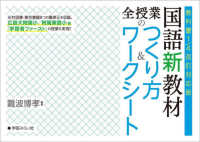基本説明
New in paperback. Hardcover was published in 2007. Two of the world's leading authorities on Davidson's work, present the definitive study of his widely admired and influential program of truth-theoretic semantics for natural languages, giving an exposition and critical examination of its foundations and applications.
Full Description
Ernest Lepore and Kirk Ludwig examine the foundations and applications of Davidson's influential program of truth-theoretic semantics for natural languages. The program uses an axiomatic truth theory for a language, which meets certain constraints, to serve the goals of a compositional meaning theory.
Lepore and Ludwig explain and clarify the motivations for the approach, and then consider how to apply the framework to a range of important natural language constructions, including quantifiers, proper names, indexicals, simple and complex demonstratives, quotation, adjectives and adverbs, the simple and perfect tenses, temporal adverbials and temporal quantifiers, tense in sentential complement clauses, attitude and indirect discourse reports, and the problem of interrogative and imperative sentences. They not only discuss Davidson's own contributions to these subjects but consider criticisms, developments, and alternatives as well. They conclude with a discussion of logical form in natural language in light of the approach, the role of the concept of truth in the program, and Davidson's view of it. Anyone working on meaning will find this book invaluable.
Contents
Introduction ; 1. Truth-theoretic semantics: basic framework ; 2. Quantifiers ; 3. Implementation of the extension of the truth theory to quantifiers ; 4. Proper names, indexicals and simple demonstratives ; 5. Complex demonstratives ; 6. The semantics of quotation ; 7. Adjectives and adverbs ; 8. The simple tenses of state and event verbs ; 9. Temporal adverbials and quantifiers ; 10. Tense in sentential complements and the perfect tenses ; 11. Opaque contexts: indirect discourse and attitude sentences ; 12. Non-declarative sentences ; 13. Semantic structure and logical form ; 14. Truth and correspondence








